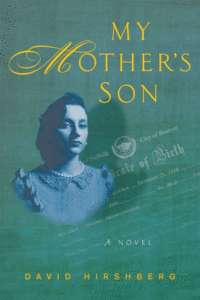Reviewed by NEAL GENDLER
Joel, one year retired from 47 years of telling stories five nights a week over a Boston radio station, begins the story of his boyhood with an accurate statement:

“When you’re a kid, they don’t always tell you the truth.”
Joel’s family didn’t, as we slowly discover in the engrossing My Mother’s Son, by David Hirshberg — pen name of “an entrepreneur who prefers to keep his business activities separate from his writing endeavors.”
Joel’s family revolves around his widowed maternal grandfather, 1900s immigrant Solomon Mischal, 68 — Solly to his friends, Papa to his descendants. He’s a great teller of stories, some of them true. He owns a furniture store, but office time usually is filled running a bookie operation with four longtime pals.
They are Moses O’Neil, who isn’t Jewish; Murph Feldman, who isn’t Irish; Chief Stinkowski, neither a Native American nor a police chief; and Derby Canurby, his nickname deriving from race winnings.
Illegality doesn’t seem a concern, for Papa and pals know enough people owing them favors — or know enough dirt on them — to obtain whatever help they need. Murph can provide authentic documents showing false information. They’re how Hamburg physician and self-taught veterinarian Jacob Goldblum entered the United States from Germany in 1938, after rescuing himself and Papa’s injured daughter, Rose.
“Auntie Rose,” living nearby, is a near-daily presence, and husband “Uncle Jake” regularly takes the boys on outings.
Papa’s other daughter is mother to Joel and Steven, almost two years older. Running a tight ship, she’s married to an accountant with both legitimate clients and Papa, for whom he cooks the books. We learn little about the father besides his calm, loving nature and wise advice.
Most of the story is set in 1952, when Joel is 12 with typical boy interests including stamps and baseball. Murph hires him and Steven as runners who bike around town carrying and fetching envelopes. Isaac Burges, the kosher butcher who’s a vegetarian, tells them that the Tuesday envelopes are for gambling. Steven figures out that the Thursday envelopes from businessmen and officials contain hush money.
Papa, learning when the Boston Braves will announce their move to Milwaukee, gathers bets. A sports writer’s postcard campaign to keep the Braves from leaving, and Papa’s political leanings, involve the boys in a theft to help elect an unnamed wealthy, attractive U.S. representative — clearly JFK — to the Senate.
This all sounds rather madcap, but it’s within a sober, even sad tale of concealments to keep the boys’ childhoods happy, and to keep up appearances in the postwar world of secular Jews.
But relatives’ uncoordinated accounts differ, and the boys try to discern which are true. Late in the book, Joel, moving into adolescence, realizes he’s changed more than his voice, gaining “the understanding that I could put things together on my own.” From differing stories’ clues, he deduces truths his family confirms.
In retirement, Joel realizes that his ability “to tie together strands of events” led to his career as a writer and radio star, telling stories — some of them true.
Hirshberg’s coming-of-age tale is written more densely than a typical popular novel. It’s not difficult to read — it’s difficult to put down — but requires attention. A five-language glossary translates foreign words sprinkled lightly throughout.
Three things seem off: A gambler and hush-money payer, the go-to official for liquor licenses, appears in 1922, during Prohibition. Collectors don’t peel stamps from envelopes; soaking or steaming are required to avoid damage. And Burgas’ doctor’s son writes home about surgery amid dirt, artillery noise and sonic booms. Aircraft supersonic in level flight weren’t in Korean combat.
These don’t damage Hirshberg’s skillful, ever-larger surprises, slowly peeling away camouflage while capturing a time of Jewish social insecurity; the naivety of pre-television youth; the terror of polio; baseball as public recreation more than big business, and an ascendant America before the divisive trauma of Vietnam.
Readers young in the 1950s will feel at home. Those younger can sense those times in a tale wonderfully told.
***
Neal Gendler is a Minneapolis writer and editor.
(American Jewish World, 5.18.18)


















